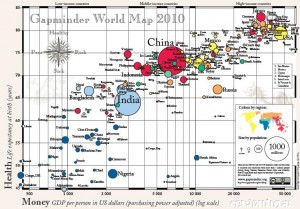I’ve previously cited charts from Hans Rosling’s Gapminder to point out that U.S. longevity is worse than would be expected based on our GDP. Click for a legible plot:

If you fit a curve and measure distance beneath the curve, among rich nations only Brunei, Qatar, and maybe Luxembourg and Liechtenstein perform worse than the US. Americans die years earlier than we ought. I believe the reason for this is probably our agricultural subsidies for wheat, corn, and soybeans and the high intake of toxins they have engendered.
Well, Dr. Rosling has a nice new video, produced by the BBC. It does a great job illustrating how strongly longevity depends on income. In all countries, as incomes have risen over the last 200 years, lifespans have increased as well. Probably this has a lot to do with food quality and investments in water, sewage removal, and sanitation.
Here’s Dr. Rosling’s tour of 200 countries and 200 years in 4 minutes:












Recent Comments